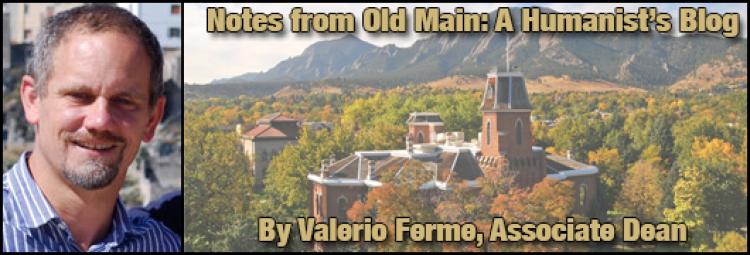Why the arts and humanities matter, follow up

Over the weekend, I shared the blog entry I wrote last Friday with my siblings. Here is what two of them (out of the 8!) wrote back. The perspectives, and their fields of study and work are quite interesting:
“Your point of view is quite relevant, since I deal with many young people who graduate college with technical or business degrees, but lack the creativity and the ability to present complex concepts clearly, as is necessary in our line of work”
(Saverio, Computer Science degree from Brown University, who worked for Oracle, and is currently a software engineer consultant in Silicon Valley)
“If this is an ‘outreach program,’ my advice is that it take place in the community and that it be accompanied by displays and workshops for interested people, as is the case for the dance presentation. Do you really think you can attract regular folk or even people of a certain culture to ‘lectures’? In my view these [lectures] reinforce the academic and distant dimension of the university, in spite of the practical and engaging nature that humanistic subjects can have for many.”
(Gian Luca, BFA in Printmaking and Animation Films from The School of the Art Institute of Chicago, M.A.A.T. in Art Therapy at the University of Illinois at Chicago, currently a Network Administrator at a college preparatory school in Chicago)
So the “techie” and the “artist-turned-IT-administrator” tackle the point from two different perspectives, which are complementary and, in my mind, go to the heart of the matter for how the Arts and Humanities function or are perceived in our society.
My brother Saverio, who has been embedded in computer culture and software engineering for the past 23 years, but who was trained in a school system (the Italian one) that emphasized a variety of subjects ranging from philosophy and history to math, chemistry and physics, confirms what the business leaders from the 2013 survey said, that we need a workforce that is creative, flexible, and trained in the Liberal Arts to advance and explain the innovations that Silicon Valley produces these days. Maybe I should ask him to give a presentation to the engineering and business students who confess to take courses in our college only because they have to do so.
Conversely, my brother Gian Luca speaks of a different need, one that is equally important for artists and humanists to address if we want to maintain our relevance in the future. His comment focuses on the perception that the Arts and Humanities, as they are performed and studied in university settings, are incapable of ‘pulling in’ and interesting the public, because they are static (“lectures”), and irrelevant to one’s everyday practical concerns. While I would disagree somewhat about the irrelevance of certain impractical aspects of the arts and humanities (i.e., the aesthetic contemplation of beauty for its own sake has tremendous consequences for how people live their lives), my brother has a point. I don’t say this lightly, but “we” (those who make a living studying the arts and humanities) often are unable to communicate and involve the public: our research into ever more narrow disciplinary areas might move those who, like us, speak the technical languages of our fields of study, but fail to move the public at large, since it does not know that of which we speak and wonders about its relevance for its day-to-day existence.
Yet, as a recent book by Doris Sommers explains (The Work of Art in the World: Civic Agency and Public Humanities, Durham: Duke University Press, 2014, click here for a review), we can and should find a way to return our work to the public sphere, because it still offers opportunities for transformational experiences. We need to engage others through a language that makes our discoveries pertinent to their daily lives. We need to explain how the particular focus of our research has broader applications for the well-being of the civic body and of the individual mind (I just read this article yesterday on the dramatic rise of anxiety disorders and depression in our society, and I think how storytelling, narrative, and poetry are being used to counter and help war veterans fight the effects of PTSD… who says that the Humanities do not have practical applications?). In short, though others might not agree, I think we need to be more accessible and hands on.
Valerio Ferme
Sept. 21, 2015

